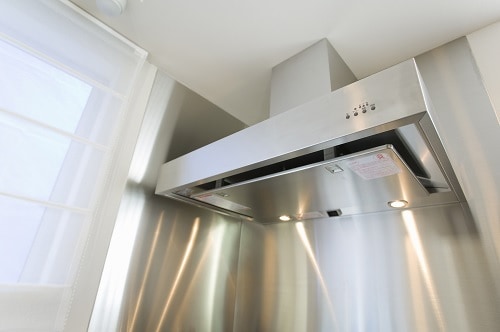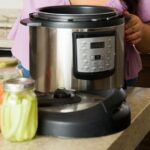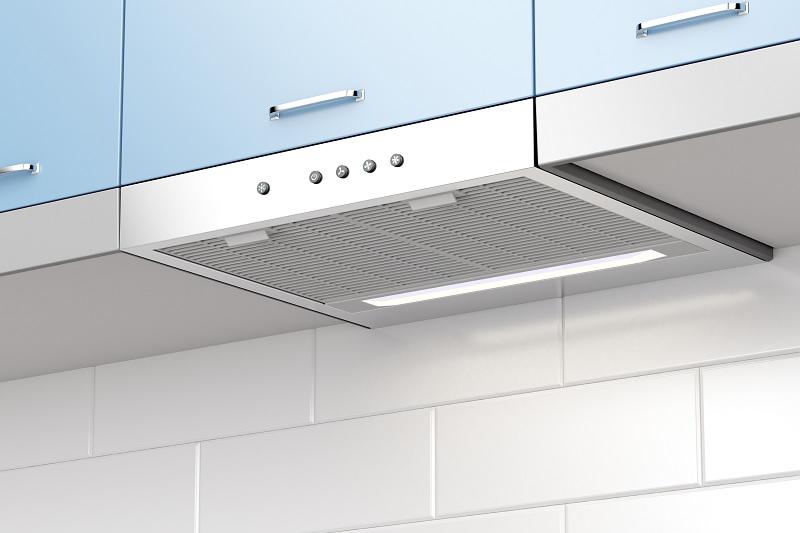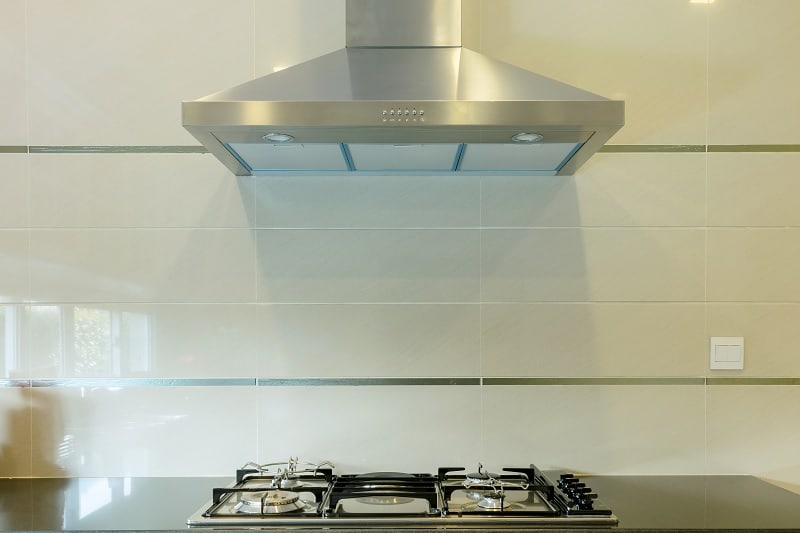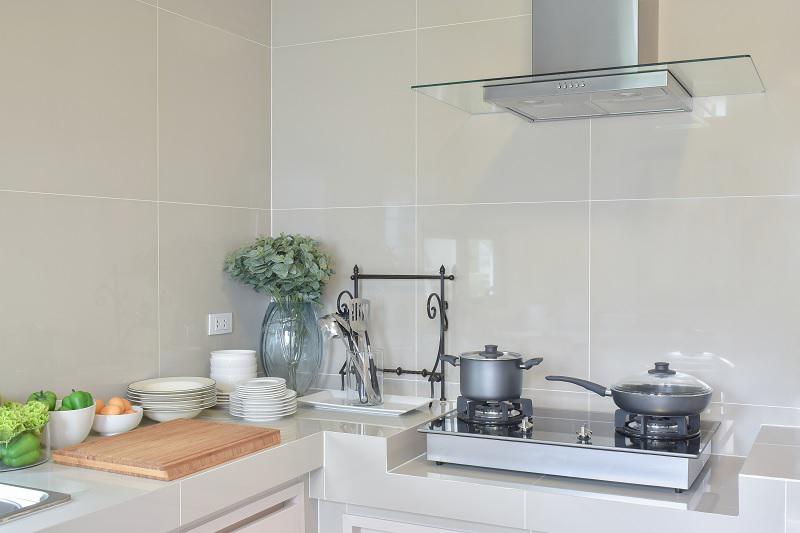Cooker hoods are an important part of a kitchen and integral to creating a clean and healthy home by removing unwanted odours.
Extraction during cooking also removes steam and grease, so your kitchen is easier to clean and maintain and becomes a more pleasant room to spend time in.
It’s easy to find a cooker hood that complements your kitchen layout and your hob, fitting in with the aesthetic of the room, but one thing we sometimes overlook when choosing a cooker hood is the potential noise level.
Cooker hoods usually fall into two categories:
- Extraction hoods – these extract air to outside of the building through ducting.
- Recirculation hoods – where the air is pushed through filters to remove any cooking smells before the air is reintroduced back into the kitchen.
Extraction hoods are often cheaper and more effective than recirculation hoods, but are often much louder.
The Problem with Noisy Cooker Hoods
If your cooker hood is too noisy it can make your kitchen an unpleasant place to be, especially if you spend a lot of time cooking.
If your cooker hood is too loud you may be tempted to not use it as often, which defies the point of having a cooker hood in the first place. More worryingly, if a cooker hood is far too noisy it could even be potentially damaging to your hearing.
An easy way to become aware of potentially harmful noise is to pay attention to warning signs that a sound might be damaging to your hearing. A sound may be harmful if you have problems hearing others talk over the sound, it makes your ears hurt or if your ears are ringing after hearing the sound.
Also, when it comes to noise sensitivity some of us have ears that are more sensitive to loud sounds at certain frequencies than others.
Understanding Cooker Hood and Extractor Fan Noise Levels
Cooker hoods are measured in decibels, with the majority of cooker hoods on the market measuring at around 60-70 decibels (dB).
Cooker hood manufactures measure noise levels of the appliance at three levels: minimum, maximum and boost, and the level is captured by microphones (representing human ears) placed one metre away from the cooker hood.
The noise levels reduces significantly when the distance to the cooker hood increases. So, for example, is 65 dB loud for a cooker hood, particular on a larger range cooker?
When you’re stood with your ears underneath a 65-70 dB cooker hood cooking with pots and pans on the stove, you would probably be near to your upper comfortable level (UCL) and wouldn’t be able to stand cooking there for very long.
Even at one metre away from the fan, it may be difficult to hear a conversation.
Even small decreases in decibels can make a big difference to perceived volume and the health of our ears – for comparison a quieter 50 dB cooker hood will sound similar to the hum of a refrigerator, whereas a 67 dB hood is similar to the noise of a vacuum cleaner or hairdryer.
Read more about cooker hood noise levels here.
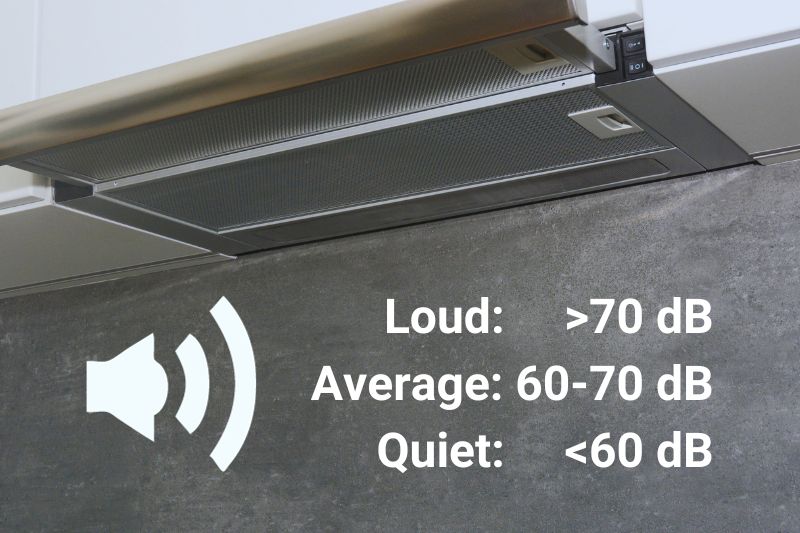
Why Is My Cooker Hood So Noisy?
Cooker hoods are basically large fans and in most cases they’re going to make a bit of noise, but some are much louder than others.
Choosing a quieter fan at purchase can reduce noise level by up to 20 dB (see some of the quietest cooker hoods here), but there can be other reasons why a cooker hood is excessively noisy, sometimes even when the hood was previously much quieter. These reasons may include:
- The fan has a build-up of dirt and grease covering blades, so they have become imbalanced and cause the fan to rattle and shake.
- The fan may be poorly fitted to the wall or joist resulting in a vibration and excessive noise.
- Ducting can have an effect on the noise level of a cooker hood. Narrow ducting can cause greater levels of pressure causing a rattle as the air flows through. The duct design may aslo cause more noise if there are a lot of bends and cross-sections.
- There may be a problem with the exhaust fan motor – for example the motor shaft bearings have worn out over a long period of use.
- An external object may have become trapped inside the Blower Wheel Housing.
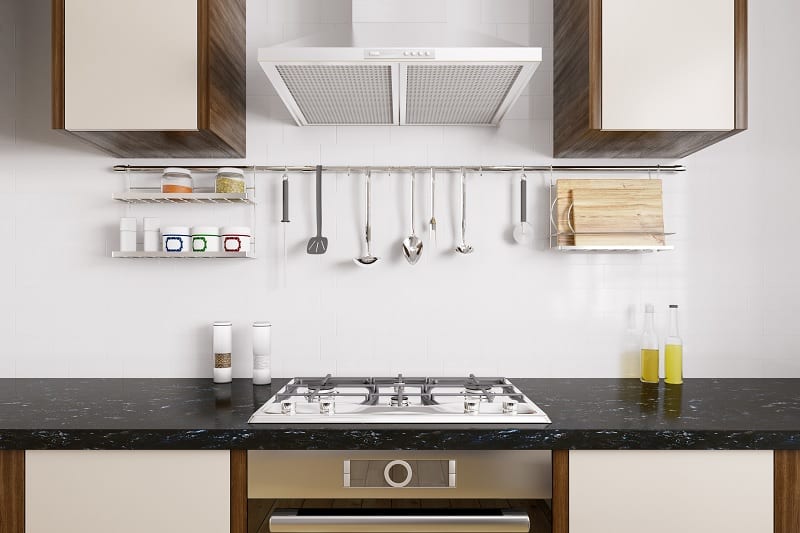
How Do You Reduce Exhaust Fan Noise?
There are several things you can try to reduce the noise of your cooker hood exhaust fan noise. It may be possible for an engineer to reduce the power sent to a fan using a potentiometer or resistor; however any rewiring or modification of the cooker hood is likely to invalidate the warranty and may result in a fan that no longer extracts properly.
More importantly, this should only be done by somebody who is fully qualified as it can be potentially dangerous. If your cooker hood is still within warranty, contact your manufacturer if you think a technical fault is causing your cooker hood to be excessively noisy.
There is however some things you can safely try to help reduce the noise of your cooker hood. Firstly, try cleaning your cooker hood yourself, using the following steps:
- Unplug the extractor at the mains before you start cleaning, and make sure the hob has cooled down from the last time you cooked.
- Remove the outer cover, and wash using a solution of washing up liquid and warm water. You can also use this solution to carefully wash the parts of the hood that can’t be removed. Rinse and dry completely using kitchen towel.
- Use a damp cloth dipped in washing-up liquid solution and wrung out (not too wet) to wipe the blades of the fan carefully, and ensure they are fully dry before you replace them.
Paper or carbon filters may also be replaced (and can be bought easily from Amazon or Lakeland), but always check the manufacture’s guide first to see if they can be cleaned or replaced.
In addition to cleaning your cooker hood, you may also be able to make a few small adjustments to help reduce the noise of the hood.
Fans can be mounted on rubber washers to help reduce vibration where a cooker hood is mounted on the wall, and changing the duct design to include less bends and cross-sections may help reduce noise, as well as using rigid duct and increasing duct size to reduce air resistance.
Damping material to the interior of the fan case may also reduce noise level by a small amount and can be simple to do, however fireproof material should always be used and you may need to check that opening the fan case will not invalidate the cooker hood warranty – as before, if in doubt ask a professional.
There are now much quieter cooker hoods available on the market, but if you’re not ready to buy a new model just yet it’s always worth giving your cooker hood some cleaning and basic maintenance first to see if noise levels improve.

Chef’s Pick is your guide to the best kitchen equipment and appliances in the UK.
We help you understand the confusing world of cookers, ovens and cookware so you can get the most out of your kitchen.

